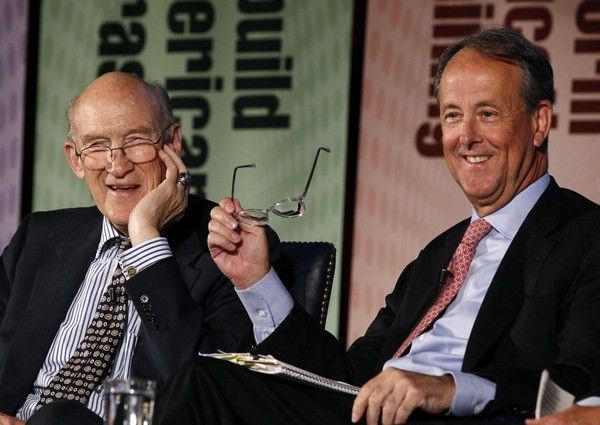The New Simpson And Bowles Plan: A $2.4T Compromise On Entitlements Cuts, New Tax Revenue

With a defense sequester looming and deficit reduction talks heading nowhere in Washington, D.C., the bipartisan duo of Alan Simpson and Erskine Bowles is expected to offer up a new plan Tuesday that would strike a compromise for Democrats and Republicans.
The new plan by Simpson, a former Republican senator from Wyoming, and Bowles, a former chief of staff during the Clinton administration, will reduce the nation’s budget deficit by $2.4 trillion over the next decade by tapping into issues at the heart of both parties' platforms -- cuts to entitlements and new tax revenue.
The Simpson-Bowles plan as outlined in the media will cut $600 billion from Medicare and Medicaid and bring in an equal amount in new tax revenue by ending or limiting tax deductions and breaks. The proposed cuts to health care programs are $200 billion more than the White House has signaled it is willing to accept. However, the $600 billion in new tax revenue, while along the lines of the increase Democrats have been calling for, will encounter Republican opposition, as the GOP is refusing another tax hike after the one that was introduced late last year.
A 39.6 percent tax increase, the first in nearly 20 years, was implemented during a "fiscal cliff" deal in January for households with incomes of $450,000 and individuals earning $400,000. Republicans were vehemently against a tax increase.
But the proposed cuts from the duo don’t stop there. A reported $1.2 trillion reduction to discretionary spending will be proposed, as well as reductions in cost-of-living increases for Social Security, slashes to farm subsidies and cuts to the military’s retirement program.
The total reduction in the Simpson-Bowles plan is higher than the $1.5 trillion goal from the White House but lower than the $4 trillion the GOP seeks.
“The failure to get our debt under control, reform our tax code and put our entitlement programs on a fiscally sustainable course is robbing us of the ability to invest in our future and will leave us without the resources we need to meet other challenges facing our nation,” the two wrote in an op-ed for Politico on Thursday. “And moving forward will be out of our reach as long as we continue to 'pass the buck' on the debt crisis. It is critical that leaders in both parties come together in an honest and meaningful way to put our fiscal house in order if they have any hope of addressing the other challenges and opportunities that we face as a nation.”
But in an outline of the new plan reported by Politico, Simpson and Bowles wrote that, while there isn’t a perfect solution to America’s fiscal problems, an agreement can bring the debt under control if both sides “put their sacred cows on the table in the spirit of principled compromise.”
The two warn that a debt reduction plan should consider several factors that include promoting economic growth and not hinder it; protecting the disadvantaged; reducing the size of the debt relative to the economy, currently around 100 per cent; reforming the tax code in a progressive, pro-growth way; cutting spending that the nation cannot afford; and tackling health care costs.
“The problem is real, the solutions are painful, and there is no easy way out,” the outline read. “What we are calling for is by no means perfect, but it could serve as a mark for real bipartisan negotiations on a plan to reduce the deficit and grow the economy. It is time for our country to put this ultra-partisanship aside and pull together, not apart. We must do it for our grandchildren; we must do it for ourselves; we must do it for our country.”
Last year, Simpson and Bowles tried to broker a fiscal cliff deal between the White House and Congress. The two centrists, who chaired Obama’s fiscal commission, also created a 2010 plan for fiscal sustainability that gained little support.
About $85 billion in across-the-board spending cuts, divided evenly between the Pentagon and non-defense programs, will kick in March 1 if lawmakers find no alternative.
A Bipartisan Path Forward To Securing America's Future
© Copyright IBTimes 2024. All rights reserved.






















